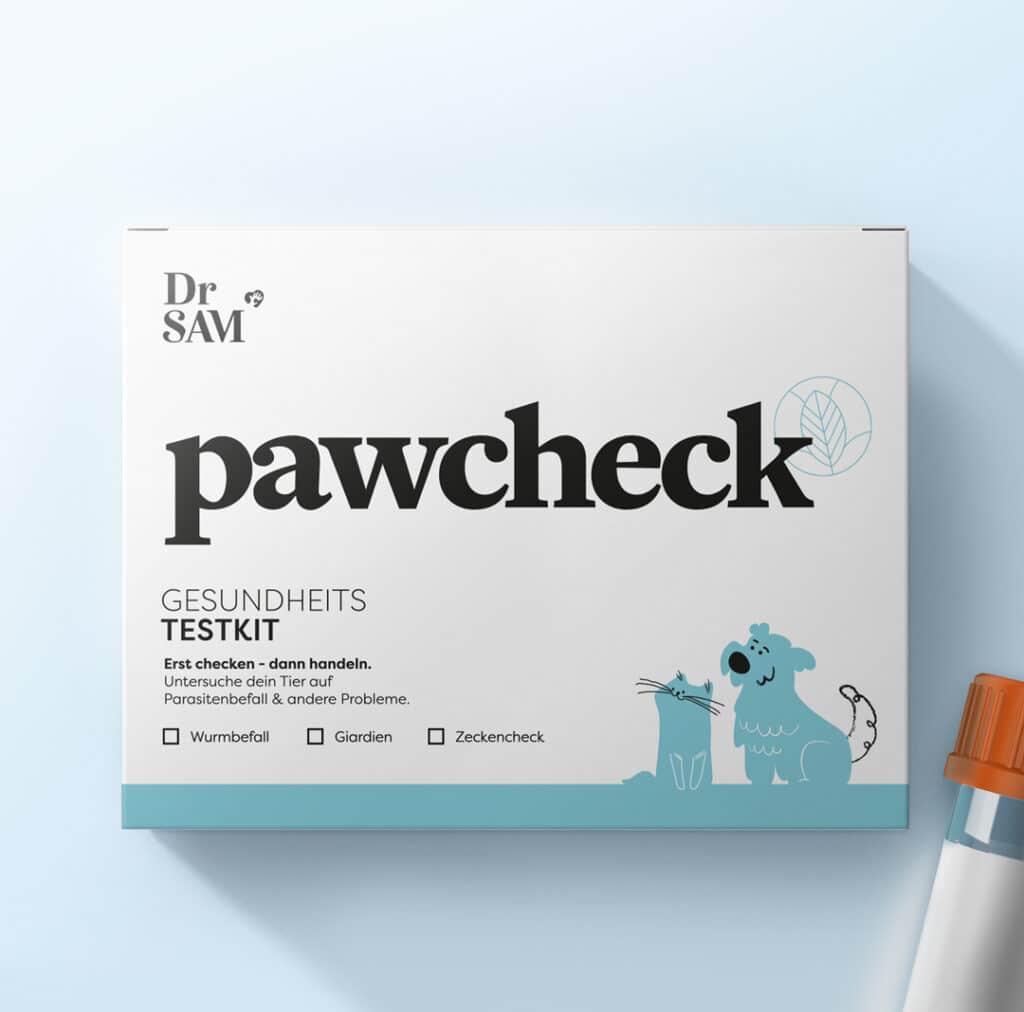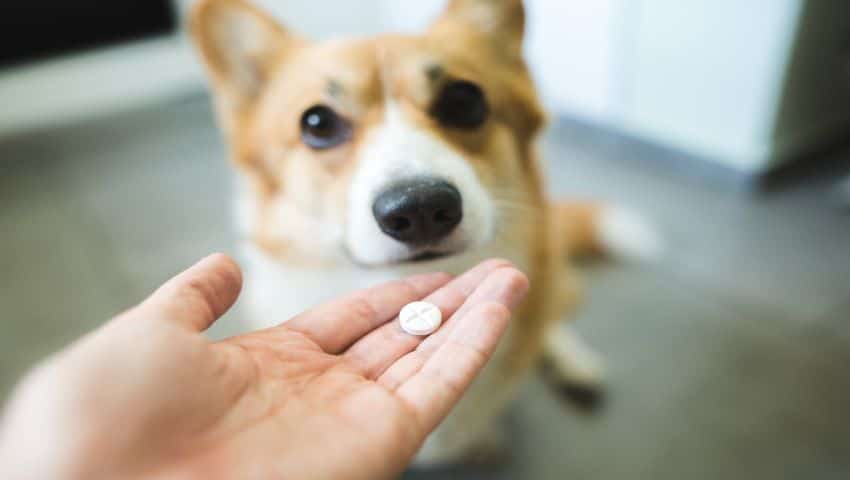Wie oft sollte eine Wurmkur beim Hund durchgeführt werden?

Es gibt im Internet zahlreiche Diskussionen, ob eine Wurmkur beim Hund nötig ist oder nicht. Die Empfehlungen variieren von pflanzlichen Präparaten bis hin zur Kotuntersuchung. Wie oft nun eine Entwurmung durchgeführt werden sollte und ob diese tatsächlich hilft, erfahrt ihr im nachfolgenden Artikel.
-
 Wufit für Hunde über 40 kg€8,95
Wufit für Hunde über 40 kg€8,95 -
 Wufitfür Hunde (21-40 kg)€7,95
Wufitfür Hunde (21-40 kg)€7,95 -
 Wufit für Hunde bis 15 kg€6,95
Wufit für Hunde bis 15 kg€6,95
Was sind Würmer eigentlich?
Würmer und Giardien befallen die inneren Organe unserer geliebten Vierbeiner. In der Regel ist zuerst der Darm betroffen, allerdings kann sich die Infektion auch auf andere Organe ausweiten. Je nach Wurmart, können auch die Leber, die Lunge, das Herz oder die Haut betroffen sein. Einige, aber nicht alle der Parasiten, die unsere Haushunde befallen, sind auch für den Menschen gefährlich. Kommen diese aber so häufig vor und macht eine Entwurmung in dem Fall Sinn?
Ursache für Würmer
In Deutschland weit verbreitet, sind vor allem Spul-, Peitschen-, und Bandwürmer, sowie die einzelligen Giardien. Allerdings werden auch hierzulande zunehmend mehr Fälle von Herz-, Haken- und Hautwurmerkrankungen festgestellt. An diesen ursprünglichen „Reisekrankheiten“, haben sich in den letzten Jahren immer mehr Hunde hier in Deutschland infiziert. Anstecken kann sich grundsätzlich jeder Hund, ob er am Wurmbefall erkrankt, hängt vom Gesundheitszustand des Hundes ab. Alle Parasiten haben gemeinsam, dass sie junge und geschwächte Hunde sehr schnell, sehr krank machen können, während sie bei ausgewachsenen, gesunden Hunden lange unentdeckt bleiben können. Eine Wurmkur schützt den Hund nicht vor einem erneuten Befall.
Die meisten Würmer werden als Eier oder Larven beim Schnüffeln abgeleckt und geschluckt, und entwickeln sich im Darm zu erwachsenen Würmern. Im Darm produzieren sie dann Eier, die über den Kot wieder in die Umgebung gelangen. Von dort aus werden wiederum Hunde, andere Tiere und auch Menschen infiziert. Bei sehr starkem Wurmbefall, können die Würmer den Dünndarm verstopfen und in den Magen, die Speiseröhre und die Leber auswandern. Solange ein Hund unerkannt Würmer beherbergt, verteilt er auch Eier oder Larven in seiner Umgebung, und kann damit andere Hunde und Menschen infizieren. Aber auch Flöhe können Würmer übertragen. Aus diesem Grund gehört eine Entwurmung nach einer Flohkur.
Herzwürmer und Hautwürmer: typische „Mittelmeerkrankheiten“, beide Wurmsorten werden als Larven von Mücken über den Stich übertragen, und wandern dann zu ihrem Ziel.
- Herzwürmer gelangen über die Blutgefäße bis zum Herzen. Dort werden sie zu ausgewachsenen Würmern von 20 bis 30 cm Länge, vermehren sich von dort ein Leben lang.
- Hautwürmer befallen nicht die Blutgefäße, sondern die Unterhaut. Sie können als Knötchen oder Beulen spürbar sein, und sind auf Menschen übertragbar.
Wie oft sollten Hunde entwurmt werden?
Grundsätzlich wird empfohlen, eine Wurmkur bei erwachsenen Hunden alle 3 Monate durchzuführen. Je nachdem wie hoch das individuelle Infektionsrisiko bei deinem Hund ist, kann die Frequenz der Entwurmung niedriger oder auch höher sein.
Wenn dein Hund viel im Wald und auf Hundeplätzen unterwegs ist und besonders gerne Mäuse fängt (und frisst), oder er sogar zur Jagd mit geht, ist es definitiv sinnvoll häufiger (monatlich!) eine Entwurmung durchzuführen.
Auch die Fütterung von rohem Fleisch (z.B. beim BARFen) erhöht das Risiko einer Infektion bei deinem Hund.
Wenn du kleine Kinder oder immunsupprimierte Personen im Haus hast, du schwanger bist, oder der Hund mit im Bett schläft und mit auf das Sofa darf, solltest du den Vierbeiner auch monatlich entwurmen, weil das Risiko groß ist, dass ihr euch ansteckt!
Durch das regelmäßige Aufsammeln und Entsorgen der Hundehäufchen kannst du die Wurmbelastung in deiner Nachbarschaft deutlich reduzieren.
Wann sollte man das erste mal eine Wurmkur beim Hund durchführen?
Da sich bereits viele Welpen im Mutterleib mit unterschiedlichen Würmern unter Umständen infizieren können, hat dies natürlich enorme Folgen für unsere kleinen Vierbeiner. Wenn die Mutter bereits infiziert ist, dann ist die Wahrscheinlichkeit sehr hoch, dass auch der Hundewelpe mit Wümern befallen ist. Dabei wandern meist Larven in die Muskulatur und schotten sich dort ab. Durch die hormonellen Veränderungen kann es vorkommen, dass im so genannten Ruhestadium dann die Parasiten wieder aktiviert werden können und somit aus der Muskulatur weiterhin in die Gebärmutter wandern. Dort findet dann die Infektion statt. Auch ist es möglich, dass sich die Hundewelpen über die Muttermilch infizieren.
Aus diesem Grund wird eine Wurmkur bereits im Alter von zweiten Woche empfohlen. Im Anschluss sollte regelmäßig, jeweils immer im Abstand von weiteren zwei Wochen eine weitere Entwurmung stattfinden. Dies sollte bis zu 2 Wochen vor Ende der Stillzeit regelmäßig durchgeführt werden.
Symptome und Diagnose
Die Symptome richten sich hauptsächlich nach dem betroffenen Organ. Allerdings können sie sehr vielfältig sein, und sehr unspezifisch. Die häufigsten 6 Symptome sind folgende:
- Durchfall: Wurmbefall führt zur Entzündung des Darms, und infolgedessen zu Durchfall. Oft ist der Durchfall farbverändert, schleimig und übelriechend, manchmal ist Blut dabei, in seltenen Fällen auch mal ein ausgewachsener Wurm.
- Schlittenfahren: Einige Bandwurmarten wandern aktiv aus dem Darm aus. Die kleinen, beweglichen Wurmglieder sehen aus wie kleine Reiskörner, und jucken ganz fürchterlich. Um den Juckreiz zu lindern, rutschen betroffene Hunde mit dem Po über raue Oberflächen.
- Erbrechen: Parasitenbefall kann zu Erbrechen führen. Auch hier liegt die Ursache in der Entzündung des Darms. Bei sehr starkem Wurmbefall kann es aber auch passieren, dass dein Hund Würmer erbricht.
- Aufgeblähter Bauch: Besonders bei Welpen ist der „Wurmbauch“ ein bekanntes Phänomen. Wenn kleine Tiere viele Würmer haben, sieht man das oft schon daran, dass der Bauch der Welpen ganz prall und rund ist. Das passiert meistens, wenn die Welpen oder das Muttertier nie eine Entwurmung hatten.
- Gewichtsverlust: Bei länger bestehenden Wurminfektionen, verlieren die betroffenen Hunde an Gewicht. Das kommt daher, dass über den dauerhaft entzündeten Darm, nicht genügend Nährstoffe aufgenommen werden können, um den Hund zu ernähren. Besonders bei Welpen und Junghunden können bleibende Schäden in der Entwicklung entstehen.
- Blutarmut (medizinisch Anämie): Wenn über eine lange Zeit, viele Parasiten im Darm eines Hundes Blut saugen, kann es zu einer Blutarmut kommen. Zusätzlich verliert der Hund auch über die entzündete, geschädigte Darmwand dauernd kleine Mengen Blut.
Die meisten Würmer sind, da sie hauptsächlich im Darm leben, am schnellsten über eine Kotuntersuchung zu diagnostizieren.
Würmer legen nicht immer durchgehend Eier, sodass eine Kotuntersuchung unter Umständen fälschlicherweise als „wurmfrei“ beurteilt werden kann, obwohl der Hund tatsächlich Würmer hat.
Ein zuverlässigeres Ergebnis bekommt man, wenn „Sammelkotproben“ untersucht werden, und zwar von mindestens 3 verschiedenen Häufchen. Es gibt 3 Möglichkeiten:
- Kotproben können unter dem Mikroskop untersucht werden, dann wird nach Eiern, Würmern, und Larven gesucht.
- Herz- und Hautwürmer werden über eine Blutuntersuchung diagnostiziert. Da diese Wurmarten in den Abendstunden aktiv sind, sollte die Blutprobe am besten erst ab 18:00 entnommen werden.
- Um Giardien zu diagnostizieren, gibt es für die Tierarztpraxis Schnell-Tests, die sich, ähnlich wie ein Schwangerschaftstest, verfärben, wenn Giardien in der Kotprobe festgestellt werden.
Eine weitere Möglichkeit stellt ein Wurmtest für Hunde dar, welcher äußerst bequem und ohne viel Aufwand von zu Hause aus durchgeführt werden kann.
Wir empfehlen euch zur Unterstützung unser Dr. SAM Produkt, das speziell von unseren Tierärzten entwickelt wurde.

pawcheck Wurmtest für Hunde und Katzen
Die Kraft der Natur für dein Tier.
- Einfache Handhabung
- Schnelles Ergebnis
- Kostenloser Versand
- Nie wieder unnötige Wurmkuren
Außerdem bringt der Wurmtest keine Nebenwirkungen mit, weshalb man sich als Haustierbesitzer keine Bedenken bei der Anwendung machen muss.
Therapie für Hunde mittels Entwurmung
Die meisten Würmer sind durch moderne Wurmmedikamente einfach zu behandeln. Entwurmungen für Hunde sind in der Regel gut verträglich und es gibt sie als aromatisierte Tabletten, die wie Leckerchen schmecken! In Europa sind bisher noch keine Resistenzen bekannt, trotzdem ist es wichtig immer auf die richtige Dosierung zu achten. Wenn es um eine Routinebehandlung geht, reicht normalerweise eine Behandlung. Wenn allerdings ein Wurmbefall nachgewiesen wurde, kann eine Wiederholung der Tablettengabe nach 10-14 Tagen sinnvoll sein, um all die Würmer abzutöten, die bei der ersten Behandlung noch im Ei für das Medikament unerreichbar waren.
Es ist mehrmals bewiesen worden, dass pflanzliche Mittel oder andere Mittel wie z.B. Knoblauchgranulat nichts gegen Würmer bringen. Viele von diesen Mitteln sind sogar kontaminiert oder können zu Vergiftungen führen! Nur, weil der Hund solche Mittel bekommen hat und nie Würmer hatte, heißt es nicht automatisch, dass diese wirksam sind.
- Die Entscheidung, ob eine Entwurmung sinnvoll ist, wird individuell von deinem Tierarzt getroffen. Besonders bei Welpen ist es immer wichtig die richtigen Medikamente auf das aktuelle Gewicht abzustimmen.
- Herz- und Hautwürmer müssen im Rahmen einer Blutuntersuchung abgeklärt werden und haben ein eigenes, spezifisches Therapieschema.
- Giardien sind sehr viel komplizierter in der Behandlung. Es gibt mehrere Medikamente, die sehr gut wirken, allerdings müssen die über einen etwas längeren Zeitraum verabreicht werden. Resistente Giardien gibt es nicht, obwohl dies sehr oft von Tierärzten behauptet wird.
Meistens ist es nicht der Fall, dass ein Wurmmedikament bei bestimmten Würmern oder Giardien nicht wirkt sondern, die Hunde sich sehr schnell wieder an der selber Quelle infizieren. Die Hygienemaßnahmen im Haushalt und in der Umgebung sind ausschlaggebend für den Therapieerfolg, dies gilt insbesondere für Giardien.
Hierzu beraten wir dich bei Dr. SAM persönlich und ausführlich.
Wurmkur als vorbeugende Maßnahme
Vollkommen vermeiden kann man den Kontakt zu Würmern und anderen Parasiten nie, deshalb gilt grundsätzlich die Empfehlung Hunde mindestens alle 3 Monate prophylaktisch zu entwurmen. Es ist aber auch möglich Kotuntersuchungen regelmäßig durchzuführen.
Die Kotuntersuchungen sind jedoch aufwändiger, da dabei 3 Kotproben alle 4 Wochen bei einem Tierarzt abgegeben werden müssen. Die Kotproben sollten dabei auch über eine Dauer von 3 Tagen gesammelt werden.
Gesamtheitlich betrachtet ist der Aufwand daher für eine prophylaktische Wurmkur geringer und wird daher von den Haustierbesitzern öfter bevorzugt. Dabei wird nämlich garantiert nicht nur der Hund, sondern auch die Mitmenschen in der Umgebung des Hundes geschützt.


